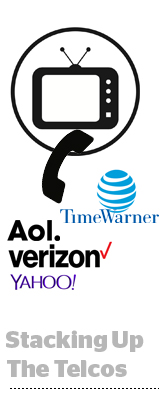 To even the most casual observer, AT&T’s $85.4 billion bid for Time Warner appears to accelerate the multiyear land grab between telcos like Verizon and the media and ad tech hybrids like AOL.
To even the most casual observer, AT&T’s $85.4 billion bid for Time Warner appears to accelerate the multiyear land grab between telcos like Verizon and the media and ad tech hybrids like AOL.
Although the deals have obvious similarities – both AT&T and Verizon are mobile carriers seeking to grow subscribers and diversify their infrastructure beyond legacy broadband and internet services businesses – there are also giant differences between the two carriers and their respective media interests.
The most glaring difference would be the top-shelf premium broadcast content AT&T would score with Time Warner, compared to the ad tech and digital media assets that Verizon picked up with its purchase of AOL (and, presumably, Yahoo).
AdExchanger compared the two carriers’ acquisition deals and media and content credo.
Deal size: Verizon and AT&T’s acquisition strategy differs mostly in sheer deal size. If you tally up the cost of AOL ($4.4 billion) and Yahoo ($4.8 billion, give or take a billion depending on whether Verizon gets the rumored discount on its impending deal because of a recent data breach), that’s less than $10 billion combined.
That total pales in comparison to the $85.4 billion AT&T is dropping on Time Warner, pending regulatory approval. For a trip down memory lane, AOL and Time Warner’s failed merger in 2001 was valued at $112 billion.
Premium Content: Should the deal go through, AT&T gets premium content with a capital “P.” HBO would bring “Game of Thrones,” “Girls” and other cult series while Turner would give the carrier news and entertainment heavyweights such as CNN and TNT. That’s a far cry from Verizon’s current content roster, which mostly consists of digital video à la AOL.
Although Yahoo does make things more interesting for Verizon in the realm of live sports – Yahoo was one of the first digital properties to live stream an NFL game and will stream 400 subsequent live sporting events across devices this year – Turner shares the exclusive rights to broadcast NCAA championship games with CBS.
Meanwhile, TNT has exclusive PGA Tournament access and digital sports publisher Bleacher Report captures 60 million monthly uniques. In other words, Time Warner’s content footprint is vast – and includes linear, digital and mobile tie-ins.
TV Chops: AT&T declared earlier this year that it would launch an over-the-top (OTT) streaming service by year’s end to rival the likes of Dish’s Sling TV and other pay TV apps. “But clearly, [Time Warner] will give them some nice, proprietary content assets as well,” said Jim Nail, research director at Forrester.
Its subsidiary DirecTV Now promised access to at least 100 live TV channels, which consumers could stream via an app on their OTT or mobile device. Although AT&T hasn’t shared specifics on pricing yet, AT&T’s CEO has said publicly that the DirecTV Now service will be priced “very aggressively.”
Contrast that with Verizon’s video streaming offering, Go90, which offers free, ad-supported live and on-demand video content aimed at millennial viewers. Go90’s pitch is “original, plot-twisting dramas to unforgettable sports moments,” which has reportedly struggled to catch on with advertisers.
AT&T, on the other hand, has dabbled only in YouTube-like content with multichannel network Fullscreen, but Turner would give it access to linear TV and Hollywood-caliber content to flow through its distribution pipes. To be fair, AOL has inked its fair share of premium broadcast agreements, including the rights to stream NBCUniversal content to AOL’s video network.
Mobile Network: Here’s where the mega-carriers could gain equal footing. Like Verizon’s cross-device development efforts via the addressable unit, Verizon Precision Market Insights, AT&T AdWorks serves as its carrier’s mobile advertising and addressable TV (given the merger with DirecTV) arm.
Verizon has been steadfast about merging its large, deterministic data set from its 1.5 billion devices around the world with AOL’s ad tech stack, which included its acquisition of mobile ad network Millennial Media, to improve targeting.
AT&T, however, has been relatively quiet about its plans on the mobile front. Although AT&T AdWorks has partnered with several mobile ad platforms, including Opera Mediaworks, it has yet to monetize its mobile data set through third-party partners.
Although Verizon has a slight edge on AT&T in US wireless subscribers – about 142 million for Verizon compared to 131 million for AT&T in Q2, according to the research firm Strategy Analytics – both are pretty evenly positioned to capitalize on cross-device targeting using deterministic data should they meet the precautionary measures required for conscious data sharing.
“It’s certainly one thing that Comcast-NBCUniversal doesn’t have that Verizon and AT&T do, which is wireless relationships with the end consumer,” Nail added. “They have the ability to stitch together those devices in much more of a first-party way that will be neater and cleaner than a lot of the probabilistic services out there. This could make cross-platform, cross-content much more feasible.”
Correction: An earlier version of the story reported AT&T partnered with Tapad and Drawbridge to enable behavioral targeting across devices. AT&T partners with these companies in its own brand advertising efforts, but not through AT&T AdWorks.













